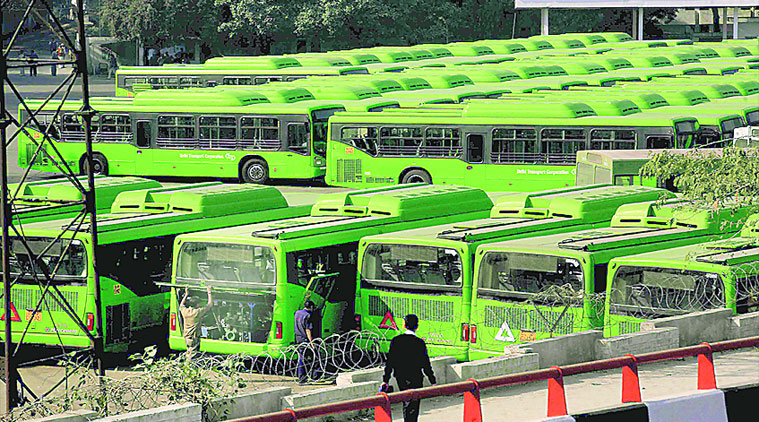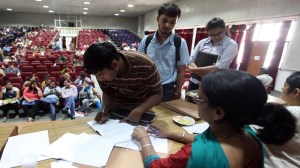- India
- International
Lack of connectivity, irregular DTC buses the often heard complaints
Three years after a young woman was brutalised in a moving bus, The Indian Express talks to four students from colleges that are not well connected by the Metro.
 Much of the public anger post the December 16 incident focused on the state of public transport in the city.
Much of the public anger post the December 16 incident focused on the state of public transport in the city.
On December 16, 2012, a young woman who boarded a chartered bus from Munirka was raped and brutalised inside it, ultimately leading to her death. Her male friend who was with her at the time was also assaulted. Much of the public anger post the incident focused on the state of public transport in the city. Three years later, has travelling in buses after dark become easier for women in the city? The Indian Express talked to four female students from different colleges of Delhi University that are not connected by the Delhi metro, to see if anything has changed.
Aditi Nehra (Aditi Mahavidyalaya, Bawana)
# Nearest metro station to college: Rithala (13 km)
A final-year student of History (Hons), for Nehra, commuting to college everyday from Ghaziabad is a task. “It takes me two hours every day to get to college. I have to change two buses every day and travel 60 km to get there. Everything about the journey is unsafe, but I have no choice,” she said.
Since the college is located in an industrial area, buses are always packed with people, mostly men. “Travelling alone in the evening or night is out of the question, so we try to travel in groups. I know that DTC buses are safer, but their frequency is very low. The choice is between being unsafe while waiting for a DTC bus and being unsafe travelling in a private bus,” she said.
“Every now and then there will be men trying to touch you in wrong ways. Once, my friend was stalked for days by a man who travelled with her in the bus. Despite knowing how unsafe we are, we can’t avoid this. We can’t stop attending our classes, can we?” she said.
Aakanksha Sehgal (Swami Shraddhanand College, Alipur)
# Nearest metro to college: Jahangirpuri (10.5 km)
A final-year student of Chemistry (Hons), Sehgal often has to stay back in college for practical classes which end late in the evening. Apart from travelling after dark, she has to travel all the way to Sonepat in Haryana where she stays with her family.

“I take the Haryana roadways bus till the Singhu Border, from where I get cluster buses to Alipur. Overall, it takes me over an hour and a half to travel one way. I would like to take the DTC buses but they are just not frequent enough. There are several cluster buses but they are always overcrowded but at least, they drop us to college on time,” she says.
Sehgal, who is actively involved in student politics, said, “There are drunk men in the bus who feel it is their right to fall on you if they feel like. When I sit in the bus at night, I just pray that it takes me to the correct location. Once the driver of a private bus took a detour, my friends and I started shouting at him, thinking something was wrong. Whenever I take a bus after dark, I check if there are women in the bus. I have to,” says Sehgal.
Isha Choudhary (Motilal Nehru College, South Campus)
# Nearest metro station to college: AIIMS (9.6 km)
A resident of Noida, Choudhary’s commute to and from college every day is anything but smooth. “I first take a shared auto from my place to Noida City Centre metro station, from where I take the metro to AIIMS. There I take a cluster bus to Satyaniketan, and a shared auto to college,” she says, explaining the complicated route.
Like other women travellers, ideally she would like to take a DTC bus, but that is not an option on most days. “The frequency is very low, next to nil. The DTC buses are not very crowded, and there’s a fixed route but the cluster buses are just so much more frequent,” said Choudhary, a first year student of English (Hons).
Also a member of the dramatics society of the college, Choudhary often has to stay back till 6.30-7.00 pm for practice. The ride back home in the evening is risky. “Even old men harass us and you can smell the alcohol on some people’s breath. The only other option is to wait, which can last up to 45 minutes, and at the bus stop, there are very few women,” she said.
Sharmila Solanki (Bhagini Nivedita College, Kair, Najafgarh)
# Nearest metro station to college: Dwarka Mor (9.3 km)
Despite being a resident of Deenpur, Najafgarh, it takes Solanki almost an hour to travel to college every day. Like most other off-campus colleges, here too cluster buses ply more frequently than DTC buses, forcing women students to use them.
“From my place, this cluster bus is the only option, but as the sun goes down, that also becomes a problem. Not only does the frequency reduce, since it’s not a DTC bus, drivers do what they feel like and don’t stop the bus at the college bus stop. Sometimes, I’ve had to wait for hours to catch a bus,” says Solanki, a final year student of History (Hons).
The bus ride in itself is in no way better, given the treatment meted out to her and other women. “Men take advantage of a crowded bus to rub against us, because they know it will be difficult for us to prove it was deliberate. When we raise our voice, the conductor tells us to keep quiet. Once a conductor told me – Zyada dimag lagane ki zaroorat nahi hai (Don’t overthink),” she says.
Apr 23: Latest News
- 01
- 02
- 03
- 04
- 05






































